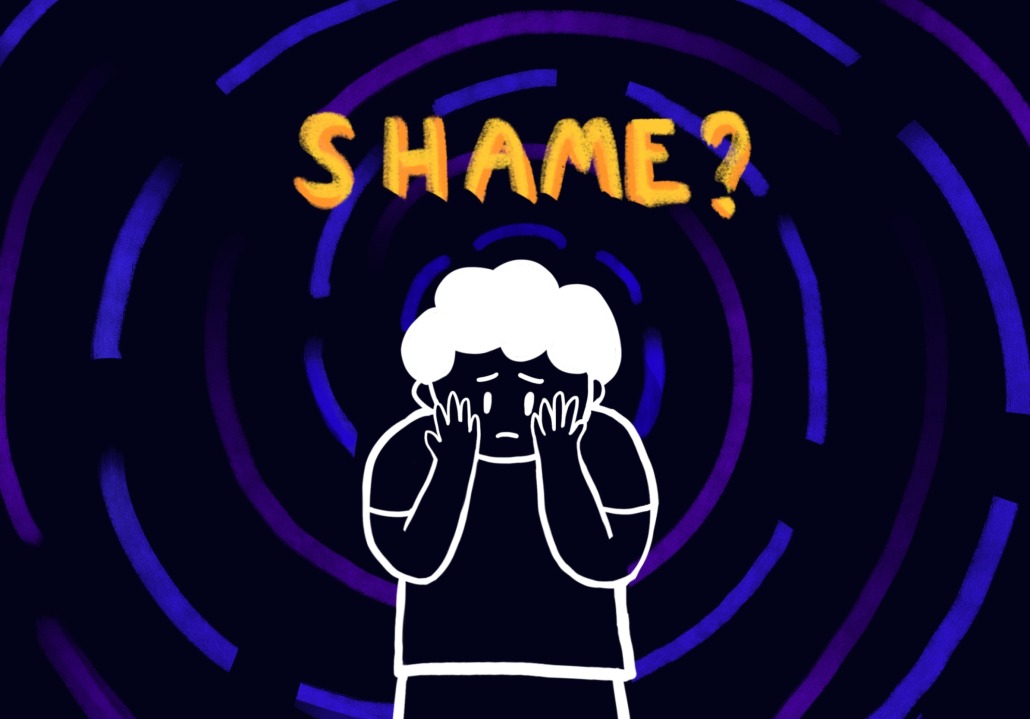THE (S)EXISTENTIALIST
You shouldn’t hate yourself into change
Shame might be an effective motivational tool, but you might be surprised what happens to your motivation and discipline when your self-worth isn’t at stake.
Shame might be an effective motivational tool, but you might be surprised what happens to your motivation and discipline when your self-worth isn’t at stake.


I was standing outside of the Annenberg School for Communication with my phone out at 9 p.m. after a late Wednesday class, caught in a sort of limbo deciding whether I should impulsively call my impulsive friend to ask if she wanted to impulsively go to the 901 Bar & Grill for “9-0 Wednesday.”
Laughing nervously on the phone, she told me she had a midterm the next day. I too would be shirking a laundry list of duties I was trying not to think about. It was, for us both, a categorically bad decision. Of course, we went anyway, feeling ashamed all the way through.
When she did well on the midterm, though, and when my life did not fall apart over the next few days, I had to wonder: Could we have skipped the step where we hated ourselves and just had a fun night? That was when I began to think about shame.
Shame differs from guilt or regret. You regret something you have done that you believe was not the right thing to do. Shame, however, is nestled somewhere deeper. You experience shame as you assign meaning to your actions, connecting them back to what they mean about you as a person. Observing a lapse in self-discipline, you might construe it as evidence of you approaching an identity you fear you might become, or as reinforcement of one you already believe you are.
Regret sounds like, “I waited until the last second to do this assignment, shoot. This does not feel good. That was a bad idea.” Shame, however, feels like, “Of course I procrastinated, I am a lazy piece of shit.” It might even feel like, “I deserve this.” Some other common cognitions I have known are “I have not gone to the gym consistently, so I am weak-willed,” and “I was infatuated with a guy who was indifferent, so I am pathetic and probably crazy.”
Last month, in performing a kind of audit on my own shame, it was mortifying to quickly realize how it has been woven throughout every domain of my life. Shame has always been a powerful motivator in my psychology. Years before grasping why regular exercise is actually good for me, the shame I internalized from angry TikTok gym bros yelling through the screen like drill sergeants was there to push me out of Parkside International Residential College at 6 a.m., shivering from the marine layer to lift weights at the Lyon Center.
I learned to use shame like gambling. I put my identity at stake, placing bets with my self-worth — when I bet correctly, and I did go to the gym consistently, it meant something positive about me as a person: I could accept the label of “sexy, disciplined badass.” But, to play the game, I had to risk everything: should I fail, I have to accept I indeed am a “lazy piece of shit.” My fear, or loathing, of the latter was often motivation enough.
In practice, this system feels absolutely rational. Why wouldn’t my failure to go to the gym mean I am a weak-willed person?
Scott Brian, a senior majoring in theatre, says this logic is what makes the idea of being shameless not as inherently positive as it sounds.
“My fear of being completely shameless is that that might lead me to be content with not performing my best,” Brian said. “That might sound like a good thing, but it also sounds like, ‘Does that mean I’m gonna start doing worse and being okay with that?’ Because that’s not what I want for myself.”
That rationale is solid, but I had to test the alternative. I wanted to see if I, in my senior year at USC, had grown to a point where I could skip the step where I constantly hate myself into and out of things and just know what is best for me, and accept when I stray off that course. I performed an experiment in which I committed to being radically shameless for the next week, resolving not to misconstrue any of my lapses in discipline as meaningful evidence toward constructing an identity for myself.
On one of those nights, I found myself up at 4 a.m., doomscrolling in a trance down YouTube Shorts before an 8 a.m. class. Committed to the experiment, I took a deep breath and resisted every impulse to allow shame to creep in. Observing myself as I had just turned the TV on to a soap opera of which I had never heard of and knew none of the characters, I mustered up an impersonal objectivity and spoke to myself:
“Wow Kevin, that was a bad idea. You just did nothing for six hours, and are now going to have four hours of sleep. Gee, this does not feel good. Okay, well, at this point all you can do is sleep, let’s not do this again.”
It felt like an act of tremendous faith, a leap into none other than my own arms. It felt lighter than what I am used to, and even more mysteriously, I still believed I was going to do my best to avoid this outcome in the future, even without my self-worth at stake — even knowing I would choose to love myself either way.
I extended the experiment, finding that, over this past month, I have still had a very real and actionable desire to improve my life. Moreover, in letting go of shame as a motivational resource, I have begun developing a new body of wisdom — a personal knowing that explains why I, Kevin Gramling, decide to take each action throughout my day.
I do not get a full night of sleep because I will hate myself otherwise. No, I do it because the morning light that creeps onto my house plants is friendlier when it is not waking me from a fitful three-hour sleep plagued by a dystopian, scrolling rectangle.
I eat throughout the day because I am just now realizing the unexplainable brain fog I once worried was a symptom of a nebulous thyroid issue always happens to fade after I eat a meal with protein. My motivation to commit to “good” habits is grounded in the emotions they cultivate, and not identities I have become attached to.
As it happens, hating myself has always been the easier thing to do. It has required more self-discipline to hold myself in compassion and observe myself with patience than to turn to loathing. The former is endlessly more motivating.
Kevin Gramling is a senior writing about his search for meaning amid the daily chaos of being a USC student. His column, “The (S)existentialist,” usually runs every other Monday.
We are the only independent newspaper here at USC, run at every level by students. That means we aren’t tied down by any other interests but those of readers like you: the students, faculty, staff and South Central residents that together make up the USC community.
Independence is a double-edged sword: We have a unique lens into the University’s actions and policies, and can hold powerful figures accountable when others cannot. But that also means our budget is severely limited. We’re already spread thin as we compensate the writers, photographers, artists, designers and editors whose incredible work you see in our daily paper; as we work to revamp and expand our digital presence, we now have additional staff making podcasts, videos, webpages, our first ever magazine and social media content, who are at risk of being unable to receive the support they deserve.
We are therefore indebted to readers like you, who, by supporting us, help keep our paper daily (we are the only remaining college paper on the West Coast that prints every single weekday), independent, free and widely accessible.
Please consider supporting us. Even $1 goes a long way in supporting our work; if you are able, you can also support us with monthly, or even annual, donations. Thank you.
This site uses cookies. By continuing to browse the site, you are agreeing to our use of cookies.
Accept settingsDo Not AcceptWe may request cookies to be set on your device. We use cookies to let us know when you visit our websites, how you interact with us, to enrich your user experience, and to customize your relationship with our website.
Click on the different category headings to find out more. You can also change some of your preferences. Note that blocking some types of cookies may impact your experience on our websites and the services we are able to offer.
These cookies are strictly necessary to provide you with services available through our website and to use some of its features.
Because these cookies are strictly necessary to deliver the website, refusing them will have impact how our site functions. You always can block or delete cookies by changing your browser settings and force blocking all cookies on this website. But this will always prompt you to accept/refuse cookies when revisiting our site.
We fully respect if you want to refuse cookies but to avoid asking you again and again kindly allow us to store a cookie for that. You are free to opt out any time or opt in for other cookies to get a better experience. If you refuse cookies we will remove all set cookies in our domain.
We provide you with a list of stored cookies on your computer in our domain so you can check what we stored. Due to security reasons we are not able to show or modify cookies from other domains. You can check these in your browser security settings.
These cookies collect information that is used either in aggregate form to help us understand how our website is being used or how effective our marketing campaigns are, or to help us customize our website and application for you in order to enhance your experience.
If you do not want that we track your visit to our site you can disable tracking in your browser here:
We also use different external services like Google Webfonts, Google Maps, and external Video providers. Since these providers may collect personal data like your IP address we allow you to block them here. Please be aware that this might heavily reduce the functionality and appearance of our site. Changes will take effect once you reload the page.
Google Webfont Settings:
Google Map Settings:
Google reCaptcha Settings:
Vimeo and Youtube video embeds:
The following cookies are also needed - You can choose if you want to allow them:
